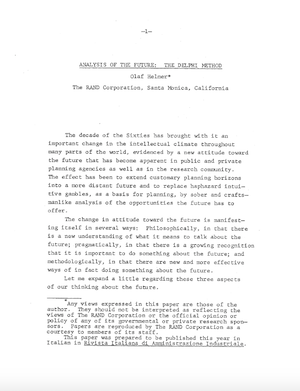Future Now
The IFTF Blog
Our Future History: The origins of modern forecasting
In the late 1950s Olaf Helmer, who co-founded Institute for the Future in 1968, developed a forecasting technique while he was at the Rand Corporation. The Delphi Method, as he called it, replaced isolated futurists making "haphazard intuitive gambles" with panels of diverse experts engaged in "operational games," acting out the "roles of decision- and policy-making entities."
From Helmer's 1967 paper, Analysis of the Future: The Delphi Method:

By being exposed within a simulated environment to a conflict situation involving an intelligent opposition, the "player," no matter how narrow his specialty, is compelled to consider many aspects of the scene that might not normally influence his opinions to the same extent as they do when he works in isolation.
The Delphi Method also employed a unique method of arriving at a consensus. Instead of holding a round table discussion to hammer out a group position, which is often flawed by compromise, strong personalities, and deference to senior people at the table, the Delphi Method used a series of questionnaires that the experts filled out anonymously. The results of each questionnaire were summarized and fed back to the experts, who were invited to reconsider their previous answers. The process was repeated four times. Opinions would usually converge. Occasionally they would bifurcate into two distinct opinions. In those cases, "the Delphi technique would have served the purpose of crystallizing the reasoning process that might lead to one or several positions on an issue and thus help to clarify the issue even in the absence of a group consensus," Helmer wrote.



